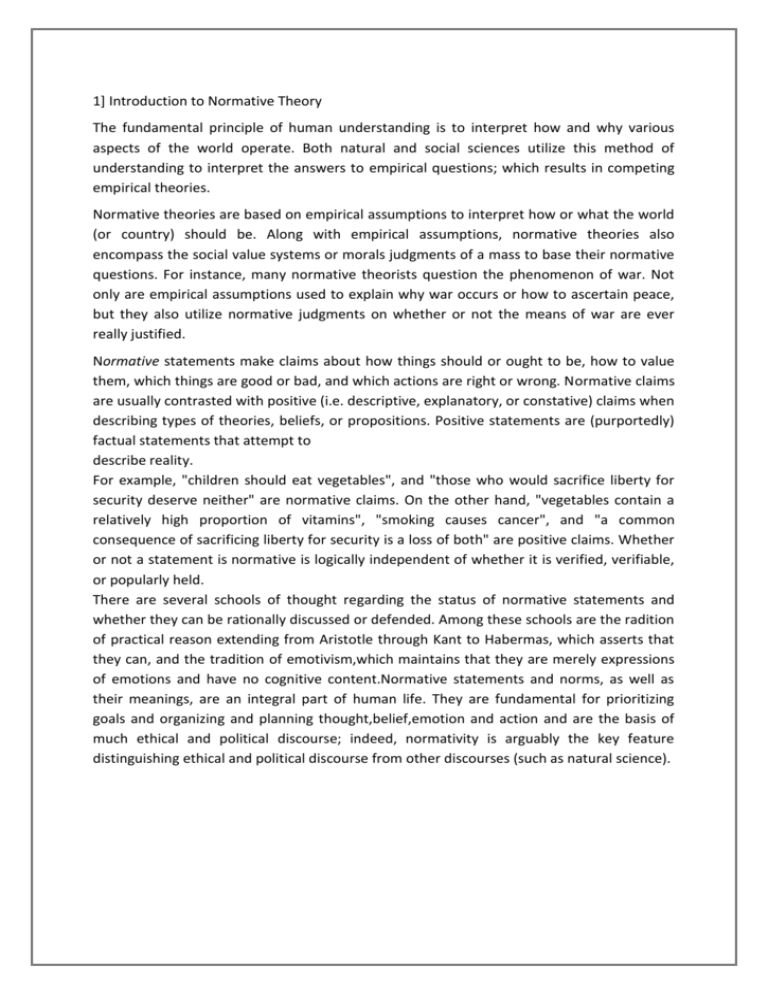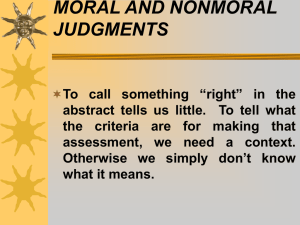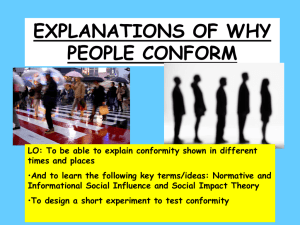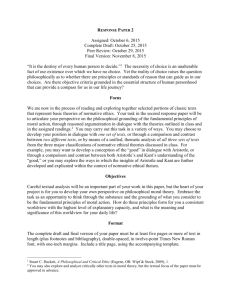Final Normative Political Theory
advertisement

1] Introduction to Normative Theory The fundamental principle of human understanding is to interpret how and why various aspects of the world operate. Both natural and social sciences utilize this method of understanding to interpret the answers to empirical questions; which results in competing empirical theories. Normative theories are based on empirical assumptions to interpret how or what the world (or country) should be. Along with empirical assumptions, normative theories also encompass the social value systems or morals judgments of a mass to base their normative questions. For instance, many normative theorists question the phenomenon of war. Not only are empirical assumptions used to explain why war occurs or how to ascertain peace, but they also utilize normative judgments on whether or not the means of war are ever really justified. Normative statements make claims about how things should or ought to be, how to value them, which things are good or bad, and which actions are right or wrong. Normative claims are usually contrasted with positive (i.e. descriptive, explanatory, or constative) claims when describing types of theories, beliefs, or propositions. Positive statements are (purportedly) factual statements that attempt to describe reality. For example, "children should eat vegetables", and "those who would sacrifice liberty for security deserve neither" are normative claims. On the other hand, "vegetables contain a relatively high proportion of vitamins", "smoking causes cancer", and "a common consequence of sacrificing liberty for security is a loss of both" are positive claims. Whether or not a statement is normative is logically independent of whether it is verified, verifiable, or popularly held. There are several schools of thought regarding the status of normative statements and whether they can be rationally discussed or defended. Among these schools are the radition of practical reason extending from Aristotle through Kant to Habermas, which asserts that they can, and the tradition of emotivism,which maintains that they are merely expressions of emotions and have no cognitive content.Normative statements and norms, as well as their meanings, are an integral part of human life. They are fundamental for prioritizing goals and organizing and planning thought,belief,emotion and action and are the basis of much ethical and political discourse; indeed, normativity is arguably the key feature distinguishing ethical and political discourse from other discourses (such as natural science). 2] Comparative Analysis of approaches to political theory – normative and empirical Empirical Theory Normative Theory 1]Empirical approach seeks to discover and 1] Normative approach seeks to determine describe facts and prescribe values 2] The empirical approach aims at making an 2] Normative approach aims at making a empirical statement which is concerned with normative statement which is concerned ‘is’ with what ‘ought to be’ or ‘ should be’. 3] The crucial point is that empirical 3] Normative statement tends to express statement is concerned with a situation which can be observed by our senseexperience, which can be verified by repeated observation and whose accuracy can be tested. preference for a particular type of order as dictated by a sense of duty or universal need or by commitment to moral principle or ideal. Normative statements are not capable of being discovered, described or verified by our sense-experience 4]Empirical Statement requiring something 4] A normative statement requires to be done is intended to serve an something to be done in order to serve an instrumental value – which is a means to intrinsic value-which is an end-in-itself (eg. some higher end the truth, the good, the beautiful) 5] The empirical approach remains largely 5] The normative approach is mainly prescriptive. descriptive. 6] Empirical approach seeks to discover laws 6] Normative approach is concerned with that are unalterable (eg. Law of gravitational laws and conditions largely created or force). adopted by human society, which are alterable (eg. Laws governing property and public order) The Issue Empirical Approach Normative Approach Chief Concern FACTS VALUES (It is so) (It “should be” or “ought be” Scientific & Descriptive Critical & Perspective (Instrumental Values) (Intrinsic Values) Based on Sense, experience & logic Speculation & logic Criterion of Validity True or False Right or Wrong Nature 3] (A)Normative and Analytic Jurisprudence: Normative jurisprudence seeks to understand the moral basis for the law what moral factors properly underlie the law and how should they shape it? The first part of this entry characterizes the standard distinction between questions about what law is and questions about what it ought to be. The second part considers two alternative ways of understanding how morality could be more closely integrated with law. These different views turn on different conceptions not only of law, but also of morality. (B) Normative and Analytic Jurisprudence: Austin’s Distinction Analytical jurisprudence is the study of the concept or nature of law, considered in its most general and abstract level .Normative jurisprudence works with the already determined concept of law, and asks what the law should be, considering whether particular areas of law or doctrine are as they should be. The Austinian picture rests on the thought that normative jurisprudence is just the study of what the law should be, where law is conceived broadly as a tool for bringing people into compliance with their moral obligations This Austinian picture of normative jurisprudence can be found even in many broadly speaking "deontological" approaches to legal issues that understood morality in terms of rules. The focus on what the law should be makes normative jurisprudence look like a special branch of applied ethics. Such questions are often supplemented by further questions about the ability of various institutions to do various jobs: suppose we want to protect individual rights, are courts or legislatures likely to do a better job? From this perspective, the fact that the questions concern the structure of a legal system enters the analysis only indirectly, by way of structural concerns about the ability of ordinary citizens to know what the law requires in particular circumstances, or the competence of officials such as police officers and courts to bring moral factors to bear on particular cases. [C] Alternatives to Austin's formulation of the distinction There are two available strategies for blunting Austin's sharp distinction between analytical and normative jurisprudence. The first (though more recent) of these can be found in the work of Ronald Dworkin, who argues that we cannot know what the law requires in a particular case without considering what it ought to be. On Dworkin's view, the posited aspects of the law, such as statutes and past judicial opinions, need to be interpreted in terms of the best moral account that would justify them as official acts that justify the more general use of coercive power against citizens. That justification, in turn, focuses on what would justify the legal system as a whole, rather than the specific official act that is being interpreted. On this view, the central question of analytical jurisprudence, "what is law?" does not receive a general answer, but only a method for generating particular ones: the law on any question is whatever the morally best interpretation of official acts and the exercise of coercive power says it is. Dworkin thus reject Austin's claim that the law in the jurisdiction can be identified through a series of purely factual, historical inquiries, in favor of the claim that the theory of law is always a normative theory. Although Dworkin's conception of the proper approach to legal interpretation draws on normative theory, and the normative theory he defends is adamantly non-utilitarian, his conception of normative theory bears one important similarity to Austin's. By starting with abstract concepts such as equality, and trying to develop the best interpretation of them through first-order moral argument. Dworkin understands the role of legal rules as one of approximating a moral result that is articulated in terms of a very different vocabulary of competitive bidding in an impartial auction through which resources are transferred to their most valued uses. Thus the normative theory against which law is evaluated and interpreted takes makes no reference to institutions. As for Austin, so for Dworkin institutions enter normative jurisprudence as effective tools which those exercising power should use achieve their moral purposes. The role of those institutions, then, is largely to coordinate conduct to bring about various goods, whether happiness, social equality, or a proper sense of community. A second alternative model of normative jurisprudence incorporates normative concepts in its conception of law from a different direction. The morality is taken to be normatively defensible in more or less the terms on which it presents itself. The morality of interpersonal interaction includes such familiar requirements include taking care not to injure other people, keeping off their property, honoring your contracts, and avoiding self-dealing while administering the affairs of others, as well as making up any wrongs you have committed. Such requirements both form the abstract structure of private law and, at the same time, are familiar to ordinary moral thought, even though there may be widespread disagreement, both among ordinary people and theorists in the natural law tradition, with respect to their fundamental moral basis. The rules are, at the same time, too abstract to provide guidance in cases of dispute. Because these legal concepts are highly abstract, normative jurisprudence understood in this way will not generate detailed recommendations to every question about what the law should be. Instead, its distinctively philosophical task is to articulate the formal structures within which legal questions are framed. On the traditional natural law view, positive law serves to make these familiar requirements sufficiently determinate and impartial in their application, so that they can in fact provide adequate guidance to action. The natural law tradition is hardly monolithic; for Aristotle, Aquinas, and Finnis the basic negative prohibitions of law and morality are generated in relation to the goods most basic to practical reason; for some later thinkers within this same broad tradition, they are structured by the systematic requirements of human freedom. The natural law view of normative jurisprudence rejects each of the Austinian residues: it supposes that morality is fundamentally rule-governed, that moral concepts require judgment to make them apply to particulars, and that legal concepts are morally basic. Without institutions, charged with applying familiar legal concepts, people could not live together on morally acceptable terms, because morality's demands would be indeterminate, and each would have no choice but to do what seemed right in his or her eyes. At the same time, it preserves Austin's distinction between what the law is and what the law should be: without positive law, as laid down, by officials, morality is incomplete. The only way to know how morality has been completed in a given jurisdiction is by looking at the acts of those officials. Many of those official acts will be indifferent in relation to the requirements of morality, and some may be openly inconsistent with them. It is only by considering those acts that it is possible to find out what the law is. At a suitable level of abstraction, you can figure out what the law should be on a subject, without knowing what it is in a given jurisdiction. Abstract reflection on the relation, say, between property and contract might lead to a principled argument about what the law should be, or how it should change. What cannot be done, however, is reflect on what the law either is or should be without appeal to familiar juridical concepts. The natural law approach is most developed in the context of private law, but a parallel strategy can be made to apply to public law. Although the natural law tradition is even more divided on this question than on the fundamental basis of private law, a single theme animates its approach: public legal rules are supposed to govern everyone, and govern the "vertical" relation between the state and individual citizens, rather than "horizontal" relations between private persons. The requirement that the state be even-handed, and that it restricts itself to public purposes – however these are properly understood – act as restrictions on the way in which any question of public law can be framed. Like the organizing categories of private law in the natural law tradition, these are highly abstract distinctions, which serve to frame questions, rather than to answer them in detail. Yet these abstract distinctions are not without content or force. The core ideas make sense of the ways in which wicked or corrupt legal systems seem to be not merely immoral, but a sort of perversion of the distinctive moral demands of legality. In order to answer more specific questions about such things as the proper way to characterize purposes as public, this framework of thought cannot avoid first-order moral argument. The distinctive feature of the natural law approach is not that it provides a template for answering everything, but rather that it provides the categories within which the questions make sense. D]. Conclusion Legal philosophy is often divided into questions of analytical jurisprudence, concerned with the nature of law, and questions of normative jurisprudence, concerned with questions about what the law ought to be. This familiar distinction can be drawn in a number of different ways. These differ less in their attitudes towards the significance of morality for law – everyone agrees that law morally ought to conform to moral demands – but rather than their attitude towards the significance of law for morality, whether basic legal concepts are morally fundamental. 4 ]A Normative Turn in Political Science?* Traditionally, the scientific study of politics has been associated with a value neutral approach to politics. One seeks to uncover what is, not what ought to be, in the political realm. This is what distinguishes a ‘‘positive’’ science from opinionizing, social engineering, or for that matter from political philosophy. While Plato and Aristotle sought to identify the characteristics of a good polity, most modern political scientists seek to identify the characteristics of polities, their causes and effects, leaving aside moral judgments about their goodness or badness. ‘‘A science cannot be a science,’’ writes Levy-Bruhl, ‘‘in so far as it is normative” In the other corner are ‘‘normative’’ theorists, those engaged in a study of the good— without explicit or sustained attention to empirical realities. Thus is the fact/value dichotomy reflected in the disciplinary subdivisions of political science. Empirical research is about facts, while normative theorizing (‘‘political theory’’) is about values. Most of the time, political scientists approach their field of study empirically. This approach asks why things are the ways they are in an indifferent, value-neutral manner. But the normative approach takes another tact. Normative theory, according to Robert E. Botsch of the University of South Carolina, Aiken, "involves questions of value, of what we should do, or of what we ought to do. This is the stuff of political philosophy." The traditional approaches to Political Science was widely prevalent till the outbreak of the Second World War. These approaches were mainly related to the traditional view of politics which emphasized the study of the state and government. Therefore, traditional approaches are primarily concerned with the study of the organization and activities of the state and principles and the ideas which underlie political organizations and activities. These approaches were normative and idealistic.The political thinkers advocating these approaches, therefore, raised questions like ‘what should be an ideal state?’ According to them the study of Political Science should be confined to the formal structures of the government, laws, rules and regulations. Thus, the advocates of the traditional approaches emphasize various norms - what ‘ought to be’ or ‘should be’ rather than ‘what is’. Characteristics of Traditional approaches: 1.Traditional approaches are largely normative and stresses on the values of politics 2.Emphasis is on the study of different political structures. 3.Traditional approaches made very little attempt to relate theory and research 4.These approaches believe that since facts and values are closely interlinked, studies in Political Science can never be scientific. After studying politics with the help of traditional approaches, the political thinkers of the later stage felt the necessity to study politics from a new perspective. Thus, to minimize the deficiencies of the traditional approaches, various new approaches have been advocated by the new political thinkers. These new approaches are regarded as the “modern aproaches” to the study of Political Science. Many thinkers regard these approaches as a reaction against the traditional approaches. These approaches are mainly concerned with scientific study of politics. The first breakthrough in this regard comes with the emergence of the behavioural revolution in Political Science. Characteristics of Modern Approaches These approaches try to draw conclusion from empirical data. These approaches go beyond the study of political structures and its historical analysis Modern Approaches believe in inter-disciplinary study They emphasize scientific methods of study and attempt to draw scientific conclusions in Political Science Philosophical Approach: This approach is regarded as the oldest approach to the study of Political Science. The emergence of this approach can be traced back to the times of the Greek philosophers like Plato and Aristotle. Leo Strauss was one of the main advocates of the philosophical approach. He believes that “the philosophy is the quest for wisdom and political philosophy is the attempt truly to know about the nature of political things and the right or good political order.” This approach firmly believes that the values cannot be separated from the study of politics. Therefore, its main concern is to judge what is good or bad in any political society. It is mainly an ethical and normative study of politics and, thus, idealistic. It deals with the problems of the nature and functions of the state, citizenship, rights and duties etc. The advocates of this approach firmly believe that political philosophy is closely linked with the political ideologies. Therefore, they are of the opinion that a political scientist must have the knowledge of good life and good society. Political philosophy helps in setting up of a good political order. The various traditional approaches to the study of Political Science have been criticized for being normative. These approaches were idealistic also as their concern went beyond how and why political events happen to what ought to happen. In the later period, the modern approaches have made an attempt to make the study of Political Science more scientific and, therefore, emphasize empiricism.








